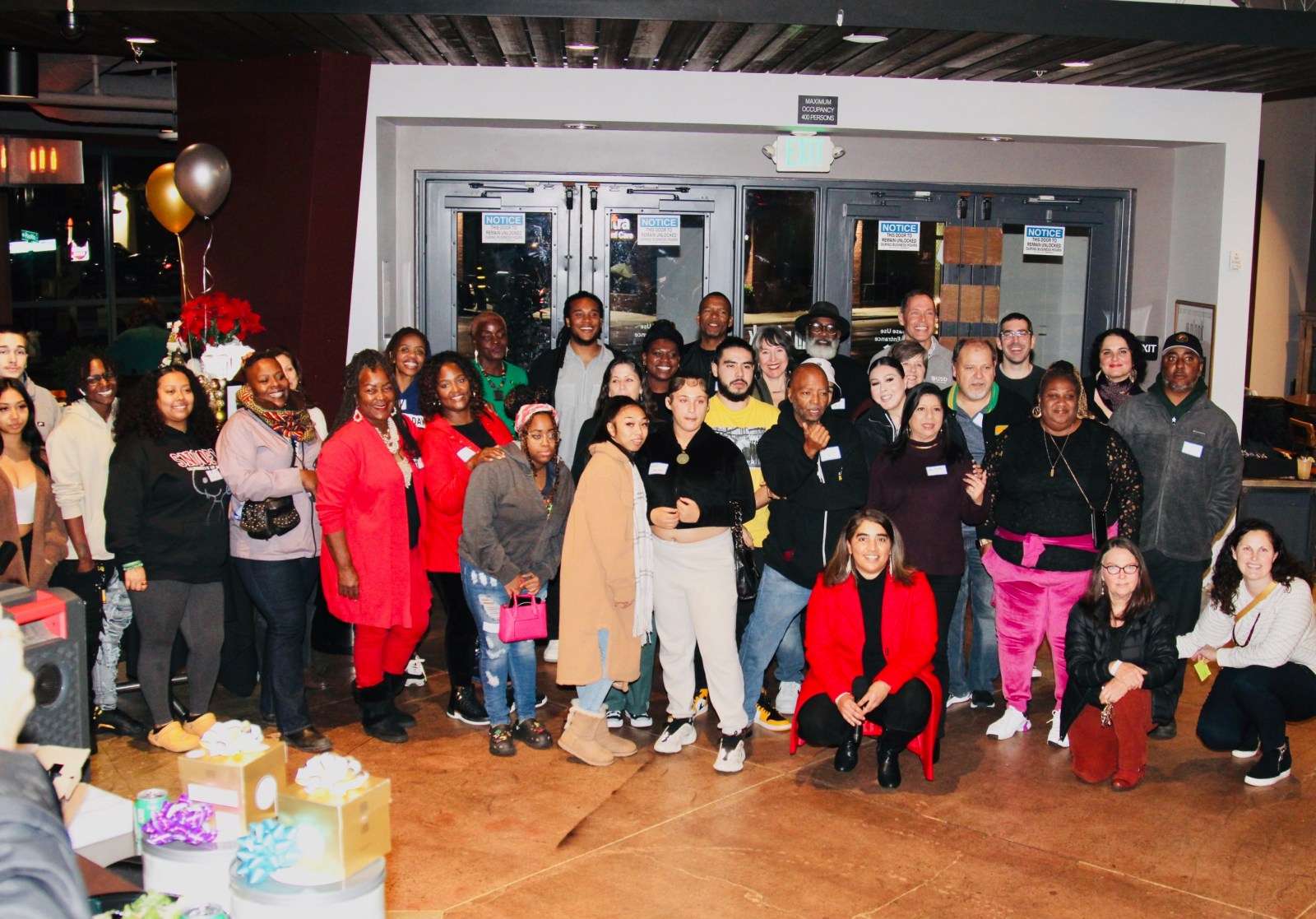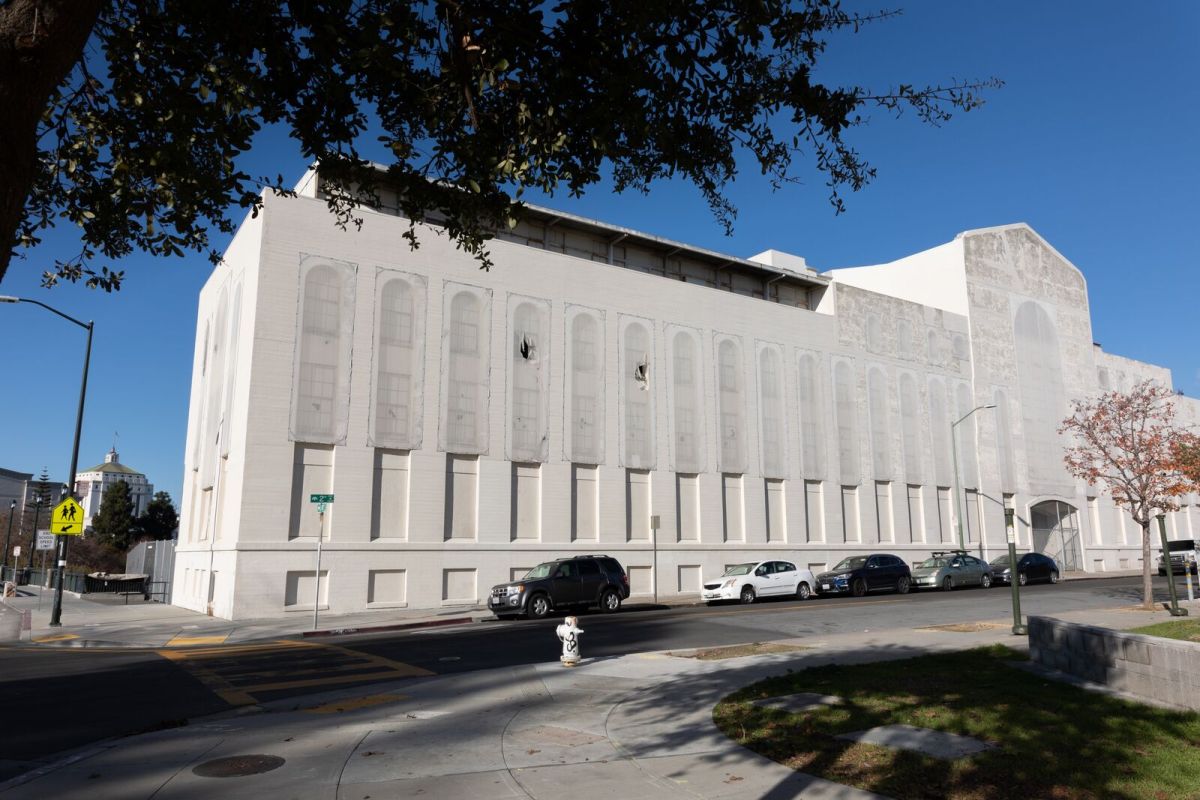The former Oakland Unified School District headquarters—two buildings totaling 96,900 square feet that have stood on a 1.6-acre parcel at the southern edge of Lake Merritt for nearly 100 years, and empty for the last 10—is finally set to be reimagined.
A coalition of young people, educators, and community organizations are working to transform the site, which was shuttered abruptly in 2013 due to flooding, into a resource hub for teens and young adults who are transitioning to adulthood out of foster care, juvenile detention, or homelessness. The project has been years in the making, and initially grew out of workshops at Camp Wilmont Sweeney, a residential program for teen boys in Alameda County’s juvenile justice center.
“Those who have been most impacted are at the forefront of the design,” said Brooklyn Williams, the project’s lead. “Our hope is that this will be built in the next five years.”
The new facility, which will honor Marcus Foster, OUSD’s first Black superintendent who was assassinated while leaving the building in 1973, is mostly being paid for with public funds. The Oakland City Council approved a $350,000 grant to the coalition last July, and the Oakland Unified School District board included a $15 million allocation for construction of the center in its project list for Measure Y, a $735 million bond that will go towards improving OUSD facilities. The project has also received about half a million dollars from philanthropy.
In November, the Oakland Unified School District board voted to move forward with the demolition of the current buildings located at 1025 Second Ave., to make way for the new project. The vision for the site includes space for career and technical education programs, a student-run cafe, mental health and academic support services, short-term housing for 16-24 year olds who are housing insecure or coming out of foster care or juvenile detention, and administrative offices for the school district’s Oakland Adult and Career Education department and its Young Adult Program, which serves adults 18-22 with disabilities.

The coalition, which meets once a week to discuss the project, is largely led by young people who have needed services like ones the hub will provide. Adanely Duenas, 20, was at times homeless and incarcerated while growing up in Oakland. Getting housing support to youth who need it, she said, will help them succeed in other areas.
“If youth have housing, that would take them off the streets. A lot of teens will stay out of trouble if they have somewhere to lay their heads at,” said Duenas, a member of the youth leadership council at Fresh Lifelines for Youth, an organization participating in the coalition. “I graduated late since I was homeless and I didn’t have time to go to school and go to work. I would choose work so I could have money and live day by day.”
Many members of the coalition were among those who opposed an OUSD plan in 2014 to sell the property to UrbanCore Development, LLC, which sought to build an apartment tower there. Community opposition scrapped that plan, and the coalition kept its eyes on the Second Avenue site due to its prime location for young adult students: It’s near downtown Oakland where there are more likely to be internship or apprenticeship opportunities, close to Laney College where students can take classes, and adjacent to Dewey Academy, an alternative high school that serves transition-aged youth who could benefit from the resources offered at the hub.

“Many of our youth who are working on this know that they probably will not be able to take advantage of the hub, and yet they’re still in it because they know they’re working on something that’s going to effect positive change for generations,” said Eve Delfin, who currently works for OUSD’s office of equity and previously worked at Dewey Academy. “They really love Oakland, and they just want it to be better.”
In 2017, Williams was running the Freedom School at Camp Sweeney, when she led a group of teen boys and young adult men through a brainstorming session to create a bill to submit to the state legislature outlining the supports they would need to successfully transition out of juvenile detention. While that bill didn’t go anywhere, the idea stuck with Williams and Imani Baylor, who was also an instructor at Camp Sweeney. Baylor, who now works at New Door Ventures, a company that helps connect youth with jobs, said she realized how much a resource hub for transitioning young adults was needed when she’d see some of her students in their neighborhoods and on the streets.
“Even though they were released on home visits, they’d go right back to the neighborhoods that they got into trouble in. Just imagine if they were able to go somewhere else that had a little bit more productivity and positivity,” Baylor said. “Just them being able to work on themselves, not in the environment that they were already set up to fail in.”
The current OUSD headquarters is in downtown Oakland at 1000 Broadway, where the district pays rent to house its central office staff. Measure Y, the facilities bond, will also pay for the construction of a new district headquarters at the former Cole Middle School site, a property which the district currently owns, in West Oakland. That project is expected to be completed in 2024.
The coalition’s next steps are the demolition of the existing buildings, and finding an architect to lead the design process for the new center, said Williams, who recently took a job as chief of education and community safety with Mayor Sheng Thao’s office. Those interested in getting involved can reach the coalition’s project manager, Saryne Miller-Menezes, at saryne11@gmail.com. The group also posts updates on its Instagram, @CTEhub_1025.
“I’m just really excited to see how this goes once it’s all built out,” said Duenas, a former Dewey student. “I know a lot of people are going to want to participate and enter the program because it’s a lot of support that youth need that sometimes schools don’t offer.”

